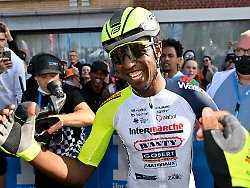The consequences of the cycling sensation
Girmay makes the whole of Africa dream of the tour
03/28/2022, 1:46 p.m
It is one of the greatest sensations in cycling history. 21-year-old Eritrean Biniam Girmay wins the classic Gent-Wevelgem on Sunday. The youngster’s victory could give African cycling a boost. The scouts of the top teams are alarmed.
On the biggest day of his young athletic life, Biniam Girmay wanted to talk less about his sheer personal happiness and more about the big picture. “This is so important for African cycling. It will change so much for the future of African riders,” said the 21-year-old from Eritrea after becoming the first black African to win a WorldTour race at the Gent-Wevelgem classic.
A sleeping giant awakens as the cycling world becomes increasingly aware of Africa’s tremendous potential. And Girmay and his small East African home country play a crucial role in this. “We are a cycling nation, people love the sport. Cycling is number one, it’s in our blood,” said Girmay at olympics.org after sensationally becoming U23 vice world champion last fall: “There are hundreds people celebrated in the streets.”
When it comes to cycling, Africa is not quite as advanced as economically backward and war-torn Eritrea, where the love of “ciclismo” came from the sad days of Italian colonial rule. Among the approximately 550 professionals in the 18 WorldTour teams there are just eight Africans, four of them white South Africans, three Eritreans and one Ethiopian. Nevertheless, the trend is unmistakable.
Eritrea is the new Colombia
Smaller and larger tours such as the Tour of Rwanda organized by the Tour de France organizer ASO are becoming established, and top European teams also take part. And in 2025 the Road World Championships will take place in Rwanda, which prevailed over a Moroccan bid. “It was a big dream of ours to come to Africa with our biggest championship,” said world association president David Lappartient.
But Africa should not just be a mere backdrop, professionals like Girmay want to meet the mostly European-South American competition on an equal footing in the coming years. The first stage victories of black Africans in the Tour de France will come “very soon”, said Girmay: “They are really strong, smart and hard workers.” His compatriot Daniel Teklehaimanot already wore the mountain jersey in the 2015 Tour.
The conditions in Eritrea are strikingly similar to those in Colombia, the biggest “exporter” of top talent: Girmay, like his compatriots, can train in his homeland in mild weather and at altitudes between 2300 and 3000m. The same conditions can also be found in Ethiopia and Kenya, the two major runner nations.
But especially in the latter, cycling, which requires unequal resources compared to running, is still fallow, currently there is no Kenyan professional – the white top star Chris Froome, born in Kenya in 1986, once excluded. Unlike in Eritrea and Rwanda, there is a lack of state lobby and support, and unlike in Colombia, European talent scouts have not yet discovered East Africa as a casting location. However, this could change after Girmay’s triumph. “We Africans used to say, okay, we’ll take part in the races in Europe,” he said, saying they were satisfied with that. “Today, however, we also want to win the races – just like everyone else.”
